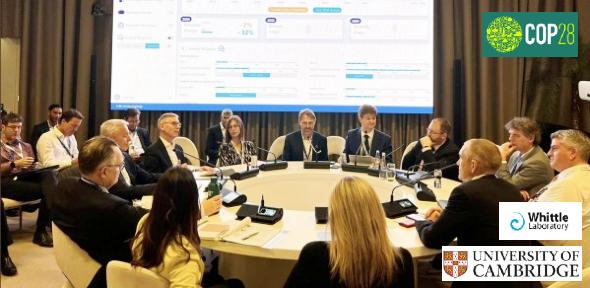
By Professor Rob Miller, Director of the Whittle Laboratory and professor of aerothermal technology
I knew even before I arrived, that COP28 would be critical in helping to raise ambition for zero emission aviation. Then at the opening reception King Charles asked me about progress on a sustainable aviation initiative he launched at Cambridge's Whittle Laboratory almost immediately after his coronation.
I had been invited by The King’s Sustainable Markets Initiative to the Business and Philanthropy Climate Forum, an event hosted by the COP28 Presidency on the first two days of COP with the aim of bringing together heads of state and CEOs to drive meaningful climate and nature action.
I’d been asked to co-chair the aviation round table with the Air Transport Action Group (ATAG).
| Aviation is a major contributor to climate change, around 2-3% of global CO2 emissions, and 6% once the non-CO2 climate impacts are included. |
| Rapid action is needed by industry and governments if we are to set a pathway to achieve zero emission aviation by 2050, and I knew this forum, which included industry leaders like Rolls-Royce, regulatory bodies like the International Civil Aviation Organization (ICAO) and sustainable finance executives from investment institutions like Bank of America was a key moment to raise ambition. |
Cambridge had been leading a team which was developing the 2030 Sustainable Aviation Goals, a set of actions which if implemented by 2030 would significantly cut the time required to achieve zero emission aviation.
This forum offered a unique opportunity to persuade global leaders that the Goals must be implemented.
We had been working extremely hard since King Charles visited the Whittle Laboratory seven months earlier, as his first event post-coronation to convene a group of aviation industry CEOs, alongside senior Government representatives, to help work on the Goals.

